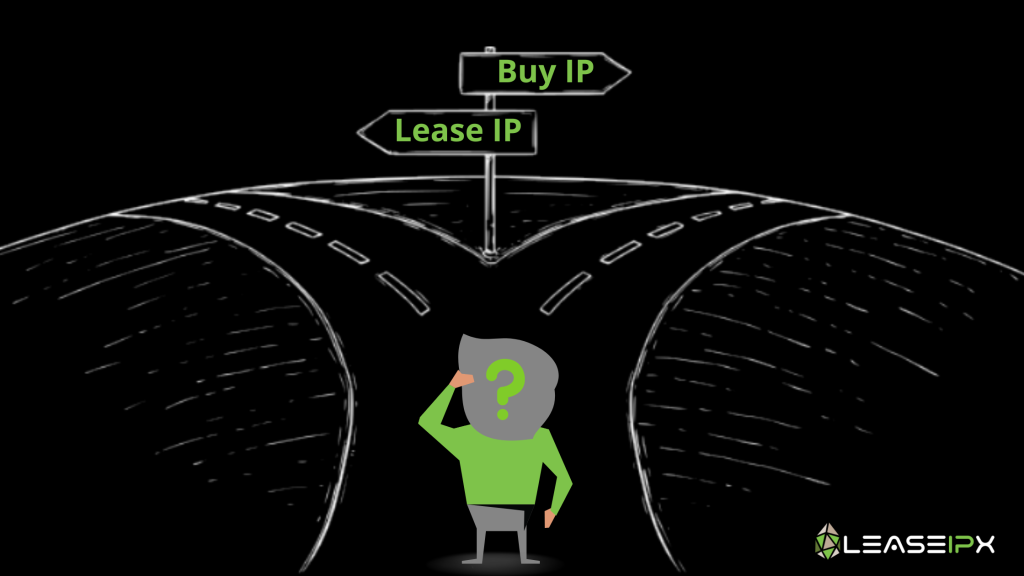IPv4 exhaustion has made IPv4 address become a scarce resource. If you want to own an IPv4 address, you must buy IPv4 address or lease IPv4 address from the existing owner. However, there are benefits and risks to Buying IPv4 Address and leasing IPv4 addresses.
If you’re looking for an IPv4 Address, you should be aware of these risks and benefits as they will help you choose whether you should Buy IP or Lease IP. This blog will tell you all the risks and benefits of buying and leasing IP addresses. Read till the end to get a better understanding of them.

Benefits of Buying IP Addresses
Buying IP Addresses can offer several benefits to businesses and organizations, including:
- Efficient use of resources: IP addresses are finite, and buying them allows organizations to use them to support their operations and grow efficiently. By having sufficient IP addresses, organizations can avoid having to share or reuse them, which can lead to potential conflicts and network downtime.
- Improved network security: A dedicated IP address can help improve network security by making it more difficult for attackers to target a specific network or device. This is because having a unique IP address makes it harder for attackers to scan and identify vulnerable devices.
- Customization: Buying IP addresses allows organizations to choose specific IP addresses that fit their needs, such as addresses that are geographically close to their customers or that match their brand or product names.
- Greater control: By owning IP addresses, organizations have greater control over their network configurations and can more easily manage their IP allocations.
- Investment potential: IPv4 addresses can be valuable commodities that can appreciate in value over time. Some organizations may buy IP addresses as an investment or diversify their portfolios.
Risks of Buying IP Addresses
While there can be benefits to buying IP addresses, organizations should be aware of several risks and potential downsides. These include:
- Cost: IP addresses can be expensive and vary depending on the region and other factors. Buying IP addresses can be a significant investment, and organizations should carefully consider the potential return on investment before purchasing.
- Legality: In some regions, buying and selling IP addresses is prohibited or subject to strict regulations. Organizations should research the legal requirements and potential risks before buying IP addresses.
- Fraud: The market for buying and selling IP addresses can be unregulated, and fraud or misrepresentation is risky. Organizations should carefully vet potential sellers and perform due diligence to ensure that the IP addresses they are buying are legitimate and not associated with fraudulent or criminal activity.
- Technical issues: Buying IP addresses can result in technical issues, such as routing problems or conflicts with other networks. Organizations should have the technical expertise and resources to manage their IP allocations and ensure their networks are properly configured.
- Transition to IPv6: As the internet transitions to IPv6, the value of IPv4 addresses may decline, and organizations may be left with a depreciating asset. Organizations should consider the potential long-term value of buying IP addresses in light of the ongoing transition to IPv6.
Overall, buying IP addresses can be a complex and risky process, and organizations should carefully evaluate the potential benefits and risks before purchasing. It’s also important to note that, in many cases, it may be more practical and cost-effective to obtain IP addresses through other means, such as leasing them from an internet service provider.
Benefits of Leasing IP Addresses
Leasing IP Addresses can offer several benefits to businesses and organizations, including:
- Cost-effectiveness: Leasing IP addresses can be a cost-effective way for businesses to acquire the addresses they need to support their operations, especially if they only need a small number of addresses or if their needs are temporary or intermittent.
- Scalability: Leasing IP addresses allows organizations to easily scale up or down their address allocations as their needs change. This is particularly useful for rapidly growing or changing organizations, as they can easily adjust their address allocations to match their changing requirements.
- Reduced risk: Leasing IP addresses reduces the risks associated with owning addresses, such as legal and regulatory issues, fraud, and technical problems. The internet service provider or other organization leasing the addresses is responsible for managing them and ensuring they are properly allocated and configured.
- Flexibility: Leasing IP addresses allows organizations to choose addresses that fit their needs, such as addresses that are geographically close to their customers or that match their brand or product names. Leasing also allows organizations to switch to different addresses if needed easily.
- Improved network security: Leasing IP addresses from a trusted internet service provider can improve network security by ensuring that the addresses are properly configured and managed. This can help prevent security breaches and other network-related problems.
Risks of Leasing IP Addresses
Leasing IP addresses can come with certain risks, including:
- Legal Issues: Leasing IP addresses may result in legal issues if the addresses are used for malicious purposes. This can lead to lawsuits, fines, and other legal consequences.
- Reputation Damage: Using leased IP addresses with a poor reputation can harm a company’s reputation and negatively impact its email deliverability and website ranking.
- Dependency: When a company leases IP addresses, it depends on the provider. This can create issues if the provider experiences downtime, network issues, or other problems.
- Compatibility Issues: Leased IP addresses may not be compatible with all software and hardware, leading to compatibility issues that can cause downtime or other problems.
- Increased Cost: Leasing IP addresses can be expensive, particularly if a company needs to lease many addresses. This can increase operating costs and reduce profitability.
- Limited Control: Leased IP addresses may be subject to certain restrictions that limit a company’s ability to use them however it wants. This can create issues if a company changes its network or infrastructure.
While leasing IP addresses may be a viable option for some companies, it is important to consider the potential risks before making a decision.
Conclusion
Buying or leasing IP addresses depends on a company’s specific needs and budget. It’s important to carefully evaluate each option’s pros and cons before ensuring that the chosen option aligns with the company’s long-term goals and strategies.
Buying IP addresses offers long-term ownership and control, allowing companies to use them as they see fit. However, Buying IP addresses requires a large upfront investment and may not be cost-effective for smaller companies. Leasing IP addresses provides a more flexible, cost-effective option for companies that need IP addresses temporarily. However, leasing IP addresses comes with certain risks, including legal issues, reputation damage, dependency, compatibility issues, increased cost, and limited control.
Companies should consider their requirements before taking the final call. If companies can figure out what they need, one of the two options will automatically start fitting their requirements.





